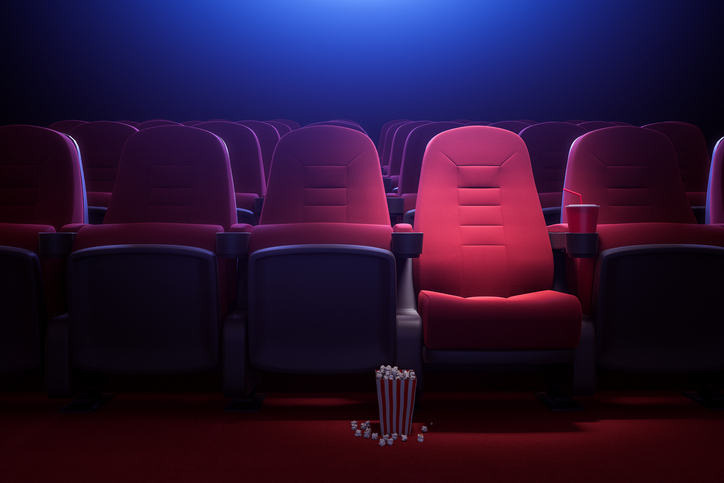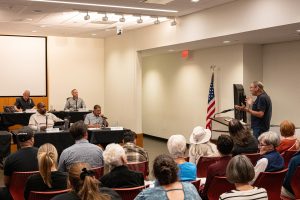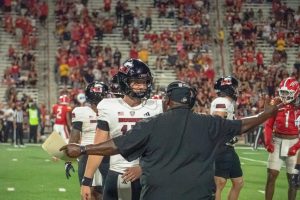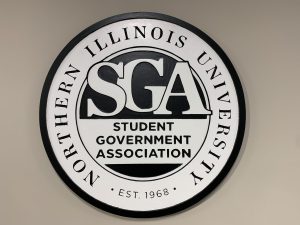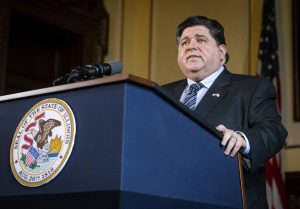Movie review: ‘The Trial of the Chicago Seven’
Screenwriter Aaron Sorkin maintains his strong and powerful voice
Getty Images/iStockphoto
Interior of empty dark cinema with rows of red seats with cup holders and popcorn. Concept of entertainment. 3d rendering toned image
October 26, 2020
In order to be truly memorable in a genre as popular and unceasing as a legal drama, one has to have a strong and powerful voice. Screenwriter Aaron Sorkin has been that voice for a long time, penning incredible films like “A Few Good Men” and “The Social Network.” That voice appears yet again in “The Trial of the Chicago Seven”: Sorkin’s sophomore directorial effort.
Based on the notorious 1969 trial, the film, released on Netflix on October 16, follows seven activist leaders who were tried in Chicago for inciting the city’s 1968 Democratic Convention riots. To prove their innocence and spread their message of ending the ongoing war in Vietnam, the seven defendants must find a way to work together and with their legal team despite being of different backgrounds and political beliefs.
The film is everything modern cinemagoers are repulsed by: slow moving scenes, a dialogue heavy story and a runtime of over two hours. This is not a film to watch mindlessly and just momentarily be entertained by.
Sorkin clearly understands the main focus of the legal drama, character interaction, and he creates incredible scenes involving the large ensemble cast. Part of the fun is that the defendants are very different from each other and their scenes together are well thought out.
The defendants consist of representatives from very different peace groups including Tom Hayden, played by Eddie Redmayne, of the moderate Students for a Democratic Society and Abbie Hoffman, played by Sacha Baron Cohen, of the more radical Youth International Party or the “Yippies.”
Having such diversity within the seven helps increase the conflict in the film and makes it less of a typical “good guy, bad guy” narrative. It also makes the group having to work together all the more powerful as they pain-stakingly find their way through the circus of a trial.
Out of the seven defendants Redmayne and Cohen are given the most screen time and also give the strongest performances, representing both the heroes of the story while also offering internal conflict with their different political views.
Mark Rylance is captivating as William Kunstler, who represents the Chicago Seven, and serves as a source of inspiration and common decency in a world that seems to sorely lack them. Yayha Abdul-Mateen II also has a powerful supporting role in the film as Bobby Seale: a Black Panther Party leader who had little to do with the riots other than being in the same city. Seale’s inclusion with the Chicago Seven by the prosecution is clearly racially motivated and his numerous attempts to defend himself without a lawyer are heartbreaking to watch.
Besides acknowledging the differences of the defense, Sorkin also shows the complexity of the prosecution. While Judge Julius Hoffman, played by Frank Langella, is worthy of scorn for his uncaring, downright biased view of the defendants while prosecutor Richard Schultz, played by Joseph Gordon Levitt, offers an even-handed approach to the case and, throughout the film, begins to question if he’s on the right side of the courtroom.
“The Trial of The Chicago Seven” smartly begins with the trial and juxtaposes the main film with scenes depicting the main characters during the 1968 protests, displaying how the protests turned into riots and how the main characters were involved. Just when a character seems fully fleshed out, the film displays a new side to them which leaves the viewer wondering what the full story is behind the riots and how that will work into the trial.
The trial itself is brilliantly written and is mainly accurate, with much of the dialogue being taken straight from the court’s transcripts. While some dramatic license is taken, the majority of what’s shown is what happened which makes the antics of the trial all the more bizarre.
“The Trial of The Chicago Seven” is, by itself, a fascinating film, however, it’s especially relevant in today’s culture. With 2020 being dominated by distrust for the Trump administration and protests against police brutality following the death of George Floyd, it feels like this film was made for 2020 despite being shot in late 2019.
Just like in the 1960s, massive demonstrations and calls for government reform are dominant which is sad upon realization at just how little has changed in half a century.
While many big blockbusters have been pushed to 2021 release dates in light of the COVID-19 pandemic, there have been many good films released this year, although some have been more difficult to find. “The Trial of the Chicago Seven” is one of the more accessible films of the year and is a captivating film that reminds viewers of America’s greatest strengths and the price it takes to uphold them.


